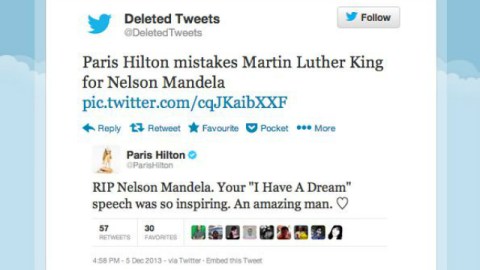During Twitter’s reaction to Mandela’s death, humans still found a way to be awful

Mandela’s legacy of a better world, with better people behaving in better ways is often nowhere better undermined than on “social” media.
During the period where the world seemed to unite in it’s admiration for the late man’s great achievements; where even I felt moved, due to recognising the groundwork he fought so hard to fit into place so that I – a non-white South African – could be treated normally; during this period, social media platforms like Twitter were in high frenzy with beautiful Tweets, idiot Tweets, disgusting Tweets, insulting Tweets and dumb Tweets.
It was, in other words, business as usual, except anchored by the passing of a moral giant who used his stature to make us all moral equals. Some of those anchors were so deep, they brought up “quotations” Mandela actually didn’t say.
Amidst the poetic and sometimes fake reflections, Twitter users didn’t forget their true selves when they discovered an alleged Tweet by American heiress and TV personality Paris Hilton.
It said: “RIP Nelson Mandela. Your “I Have a Dream” speech was so inspiring. An Amazing man.”
The “original” Paris Hilton Tweet itself appeared as an embedded image from an account called “@DeletedTweets”. That tweet, last I checked, had been retweeted 12,670 times. You can see it screencapped on Graham Cluley’s blog.
Before several people alerted them to the dubious nature of the Tweet, Foreign Policy linked to it in their list of notable Tweets. Anonymous’ Twitter account, with more than a million followers, also claimed Hilton made the mistake (don’t expect the Tweet to be there when this goes live). Further, the “original” Hilton Tweet didn’t appear anywhere and the @DeletedTweets account “mysteriously” vanished. Finally, I present a “message” from “Paris Hilton”.

(Hint: It’s not actually a message from Paris Hilton but made easily, by for example sites like this.)
All this, however, did not stop Twitter users from whipping their outrage horses into agitation and galloping forth with the mockery bandwagon. “Paris Hilton went full retard”, “Paris Hilton is the epitome of stupid and clueless” and on and on went Twitter users.
Many would agree that hating harmless strangers is unwarranted. Yet we’ve seen how easy it is to begin mocking them, given the right nudging and unverified assertions of their actions. Hilton, indeed, is renowned for being hated and portrayed as “dumb”. To judge someone by how they’re portrayed on television shows or represented by the tabloid press is akin to judging a book by a crumpled cover.
Of course, she did awkwardly make homophobic and ignorant statements to a gay friend. She, and anyone – especially anyone with influence – warrants being called out for that. But that still doesn’t constitute reason for hate and people hated her before such incidents.
This isn’t particular to Hilton but celebrities in general, who often some say “ask for it” by virtue of being a celebrity. I don’t think that most –or any? – however, ask to be hounded by desperate, lecherous photographers, stalked, trash trawled, picked apart for their weight, their dress, their teeth, their private actions and love interests from a myriad different directions and strangers everyday. They aren’t really persons, some of us think: they’re beings that exist in a multitude of flat formats – screens or paper – that won’t care we express hate or anger at their minor misdeeds (or what we have decided are misdeeds).
And this mindset is in full force on social media platforms. Anyone and everyone can be reduced to a 2D bullseye for mindless, unthinking hate or mockery, due to whatever action we’ve decided we dislike. Today, however, it’s easier to deliver that hate and to receive it, experience it. Our social media platforms don’t diminish this impact, they increase it and concurrently the responsibility; but we keep forgetting both of those aspects with our automatic retweets, with our hatred and other bullyish behaviours that were mere private reactions before these platforms. We’ve taken that mindset that had little repercussion amidst the few people around us to the wide world where anyone and everyone can see our thoughts on celebrities, on politics, on racism, on gays and lesbians.
We forget we’re all public figures.
At a time when so many were united in their admiration for Nelson Mandela, it was a gentle and wonderful moment of reprieve from the stupid nature of this species.
But anything can be an excuse to rise out of that boring drudgery of being decent, it seems: Don’t wait to hate, seems to be our new motto for this digital age. The Google Search buttons should just be replaced with “Offend Me” and “I’m Feeling Hateful”.
Perhaps one way to try prevent this is to develop a rule of thumb for social media and general Internet usage: If you see a reason to hate, default to thinking maybe it’s not true or you don’t have the full story. And if you do have the full story of something that seems not pleasant, ask whether mockery and hatred will help. I don’t dispute mockery as a tool, only that most of us are terrible at using it.
No doubt Miss Hilton is continuing to receive unwarranted hate, probably made more vicious since people will probably claim she’s “insulting Mandela’s memory” or something equally tortuous.
What’s probably truly “insulting” to Mandela’s goals and memory (if you’ll excuse that tired cliche) is our continual use of these important technological tools that should make us better at helping each other being used as new ways to hate, mock and deride harmless strangers – even famous ones. That those who praised admiration for Mandela were also quick to express hatred for Hilton shows a collapse of moral continuity that made him such an important figure.
He was better than the rest of us. But today it probably takes social media silliness to remind us of how far the rest of still have to go.
Header Image Credit: Graham Cluley
In-text Image Made with Let Me Tweet that For You: http://lemmetweetthatforyou.com/





